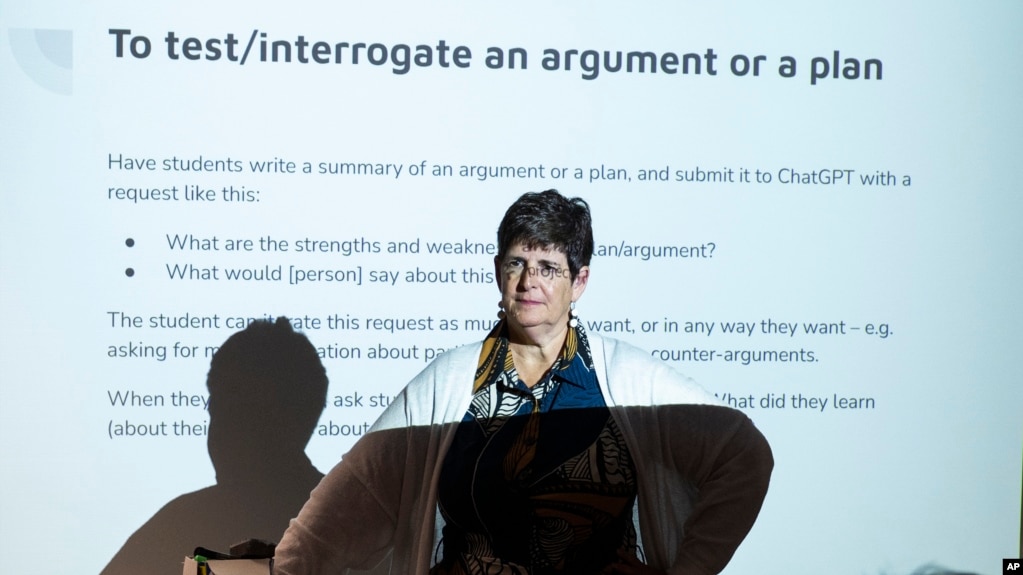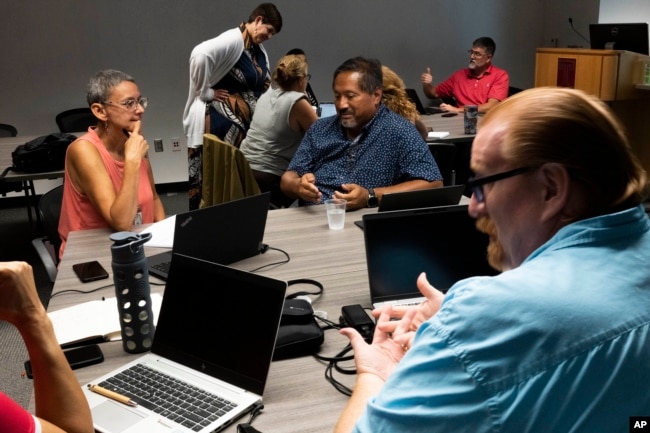Educators Seek to Stop AI Use for Cheating

Recently, artificial intelligence (AI) services - such as ChatGPT – have become a major resource for cheating in university.
Now, teachers are thinking of new ways to teach classes in order to stop students from cheating with AI. Teachers say they want to use AI to teach and learn in new ways. However, they need to stop students from using the technology on assignments and tests.
For some students, that means a return to paper tests instead of online tests. Some teachers will be requiring students to show the editing history and drafts of their work to prove their thought processes. Other teachers, though, think students have always found a way to cheat and AI is just the newest tool.
The recent growth in the number of AI services has raised many questions for educators. They want students to give correct answers but also know how to do the work to get to those answers. Educators say there is agreement at least on some of the most pressing challenges they face with AI use.
They say it is difficult to identify AI-created schoolwork. They say sometimes students are accused of using AI to cheat when they did not.

Fiore hosts a faculty teaching circle on artificial intelligence on Aug. 9, 2023, at Temple University in Philadelphia. Educators say they want to embrace the technology’s potential to teach and learn in new ways, but when it comes to assessing students, they see a need to “ChatGPT-proof” test questions and assignments. (AP Photo/Joe Lamberti)
In some cases, the cheating is clear to see, said Timothy Main, a writing professor at Conestoga College in Canada. He told the Associated Press, “I had answers come in that said, ‘I am just an AI language model, I don’t have an opinion on that.’”
Last semester, Main’s writing class had 57 academic honesty cases. Half of them involved use of AI to cheat.
This fall, Main and his fellow professors are changing the rules for the writing course. The teachers will ask students to write more about their opinions. They also put in place strong rules against using AI.
College administrators have asked teachers to make the rules more clear. Many universities are letting their professors decide the rules about using AI on their own.
At Michigan State University, professors are given several options of statements to choose from, administrator Bill Hart-Davidson told the AP.
“Asking students questions like, ‘Tell me in three sentences what is the Krebs cycle in chemistry?’ That’s not going to work anymore, because ChatGPT will spit out a perfectly fine answer to that question,” Hart-Davidson said. He thinks professors should word their questions differently.
Evidence is growing that AI services have changed how students study and find information.

Robin Kolodny, left, a political science professor, works with Eunsook Ha Rhee, an associate professor of instruction, during a faculty teaching circle on artificial intelligence on Wednesday, Aug. 9, 2023, at Temple University in Philadelphia. (AP Photo/Joe Lamberti)
Chegg Inc. is an online company that helps students with schoolwork. Its services have been identified in many cheating cases. On May 1, the company’s leader warned that ChatGPT was hurting the business’s growth. He said students who were paying for help from Chegg were now using ChatGPT for free instead.
The day after he spoke, the company’s market value fell by almost 50 percent.
Bonnie MacKellar, a computer science professor at St. John’s University in New York City, thinks that there is going to be a move back to paper tests. Her class already had a “plagiarism problem” she said, and she worries that new students may not learn the skills needed for more difficult classes.
Ronan Takizawa, a sophomore at Colorado College, has never had a computer science exam on paper. He agrees that it would make sure students learn the material.
However, Takizawa thinks that students are still not sure when it is alright to use AI and when such use is cheating. Other students say ChatGPT has made them afraid about being unjustly accused of cheating.
Arizona State University sophomore Nathan LeVang says he checks all his assignments with a tool that helps identify AI material.
“If it takes me 10 minutes after I write my essay to make sure everything checks out, that’s fine,” Levang told the AP, adding, “It’s extra work, but I think that’s the reality we live in.”
Words in This Story
edit – n. to correct, revise, and prepare for publication
draft – n. a preliminary sketch, outline, or version
challenge – n. a stimulating task or problem
academic – adj. of, relating to, or associated with an academy or school especially of higher learning
plagiarism – n. the act of stealing and passing off (the ideas or words of another) as one's own: the use of another's production without crediting the source
https://learningenglish.voanews.com/a/educators-seek-barriers-to-ai-use-for-cheating/7224907.html